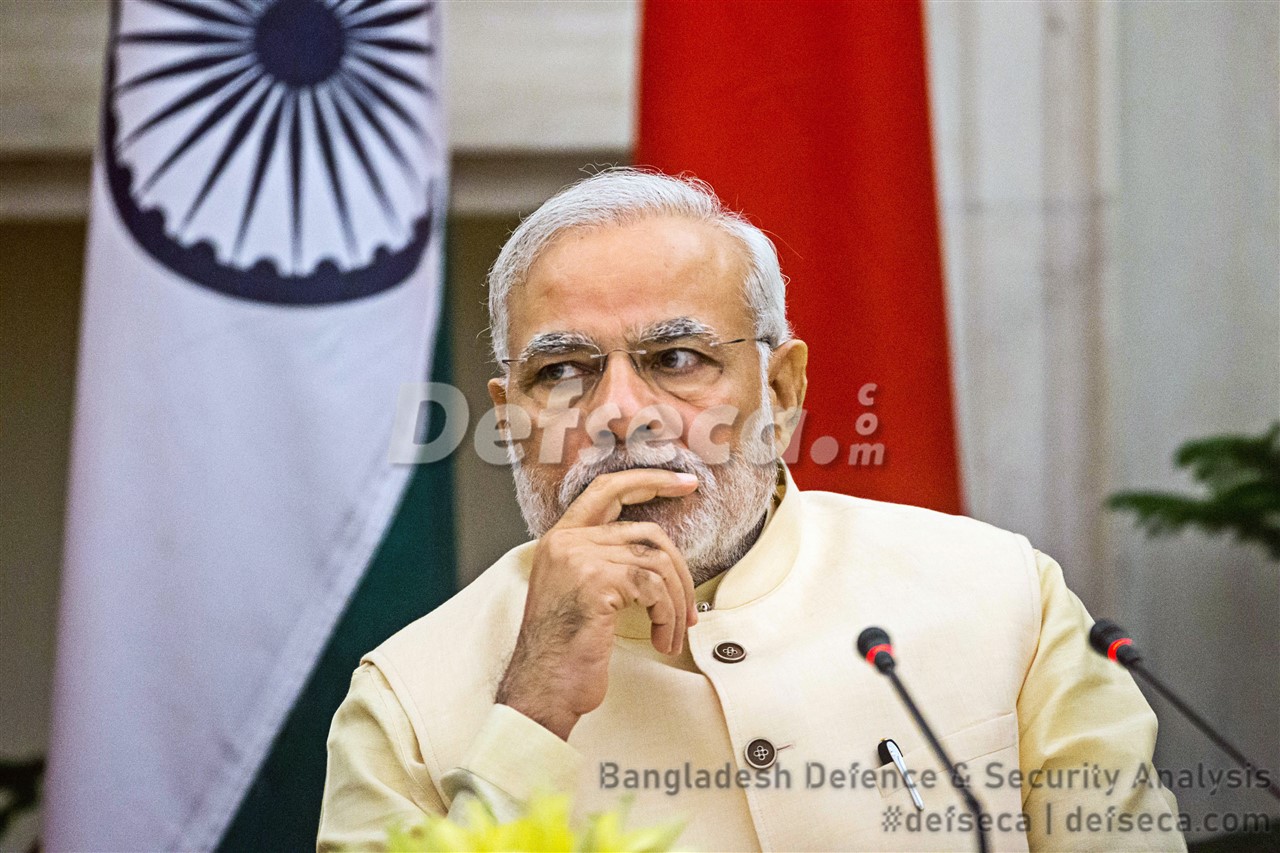Bangladesh has always tried to maintain very good relations with its neighbours to the extent that its own interests are often overlooked. Some countries in the region, particularly India took advantage of Bangladesh’s overly friendly foreign policy.
Bangladesh has given much to India over the years from transit, to water and addressed its security concerns in relation to terrorists and insurgents based in North East Indian states.
However in return India often tried to interfere in Bangladesh’s domestic politics, conduct unauthorised intelligence activities within Bangladesh territory, often use BSF to extra-judicially kill Bangladeshi nationals on the border, comprehensively aid insurgents in the CHT and foment Hindu-terrorism.
In recent times India’s paranoid aggressive behavior took a sharp turn after the Bangladesh Navy procured submarines from China in accordance with upgrading its naval capabilities under Forces Goal 2030. Having none of it Indian strategic affairs commentators made vile comments that are beyond norms of any friendly neighbours characteristics.
India dispatched everyone from their Defence Minister to tri-services chiefs in rotation to woo or threaten Bangladesh at one time or another.
India offered a meagre $500 million in defence credit to the Bangladesh Armed Forces in an unsolicited manner during Sheikh Hasina’s visit to India in 2018. The Bangladesh Armed Forces have refused to utilise the “loan package” because it would force the military to use Indian-made military equipment known the world over for being over-priced and under capable. For this reason the Bangladesh government decided to use some of the money from the loan package to develop the coastal surveillance radar network which was originally supposed to be established with the help of the Japanese government. Other countries such as Australia, China and USA have also shown interest in the program to improve Bangladesh’s maritime security as part of its Blue Economy plan.
In recent times Indian media fabricated an entirely imaginative scenario that the Indian Navy would be somehow able to access and view data collated by the planned coastal surveillance network which are to be operated by the Bangladesh Coast Guard. The Bangladesh Navy clarified the coastal surveillance network will be under the full control of the Bangladesh Coast Guard. The 2D radar systems will not be able to detect any submarines or underwater activity. It will not be connected to any Indian defence networks by any means and rather the system will be linked by Bangabandhu Satellite-1 which was developed by Franco-Italian Thales Alenia Space and launched by SpaceX Falcon 9 Block 5 rocket in June 2018 from the Keneddy Space Centre, Florida USA.
The National Register of Citizens (NRC) of India is also causing a major friction in to Bangladesh-India relations. Bangladesh is concerned the racist scheme would make millions of Bengali people stateless and cause the Indian government to attempt pushing in of those stateless Indian Bengali nationals in to Bangladesh. India’s central government remains mum about this new scheme against Bengali people of India when the Bangladesh government repeatedly made inquiries about the program. What was envisioned as an anti-Muslim exercise embarrassingly turned out to make mostly Hindu Bengali’s stateless including some politicians who actually supported the program. There have been cases where interred persons died in Indian government custody however the government tried to send their bodies back to their homes in India making a mockery of the whole affair.
With Bangladeshi people already upset with Sheikh Hasina’s perceived pro-India activities the Bangladesh government is under pressure not to make any further concessions to India in the expense of Bangladesh’s own national interests.
The powerful Bangladesh armed forces have made their position clear that national security will not be something India gets to interfere in.
Bangladesh is expanding its relations with China, United States, Turkey, Saudi Arabia and the United Kingdom to ensure it maintains a military deterrence capability against India in the event the relations with India becomes soured beyond repair.
India would be advised to keep clear of fomenting trouble in the region. Their transfer of military equipment and training to Myanmar has also not gone unnoticed by Bangladeshi forces as well as other neighbouring countries. The nexus that exists between New Delhi and Naypyidaw will leave India in a weaker position in relation to its dealings with Bangladesh.
Unless India totally resets its foreign relations with Bangladesh it is heading down a point of no return. Future generations of Bangladeshis would not feel the need to maintain any cordial relations with India because Bangladesh would be economically, politically and militarily able to counter their machinations head-on beyond 2030.
At present the Bangladesh armed forces are on a path to expand their capabilities by way of introducing new types of military hardware and adding more personnel.
The fact that an overwhelming majority of people in Bangladesh today believe India is an enemy nation is a clear indication of the failure of New Delhi’s foreign policy towards Bangladesh and the careless, inept way Indian government officials deal with the subject matter “Bangladesh”.
This negative perception of India would take decades to repair even if India started to reset the relations today. Perhaps they already know it’s too late to salvage India’s reputation. A reputation that went from liberator to oppressor in a matter of years.
Bangladesh is in a prime position to keep India under pressure beyond 2030. The Belt Road Initiative, which India opposed vehemently is also something being realised by China with cooperation of Nepal, Bangladesh, Pakistan and other neighbouring countries. It will ultimately make India more isolated in the region and is a direct result of its own nefarious actions to disturb the progress of its neighbours.
As I typed this article today the Chinese are busy preparing for the transfer of two guided missile frigates to the Bangladesh Navy. They already sold two submarines, two frigates, four corvettes and two missile-armed large patrol craft to the Bangladesh Navy during Sheikh Hasina’s reign since 2009. The Chinese government has also extended over $20 billion in loans to develop Bangladesh’s infrastructure. They are involved in almost all critical strategic sectors of Bangladesh including defence, energy, communication and ICT.
China’s policy towards Bangladesh is something New Delhi should aim to copy verbatim instead of sabotage. Yet India does not have the wherewithal to do anything remotely close.




